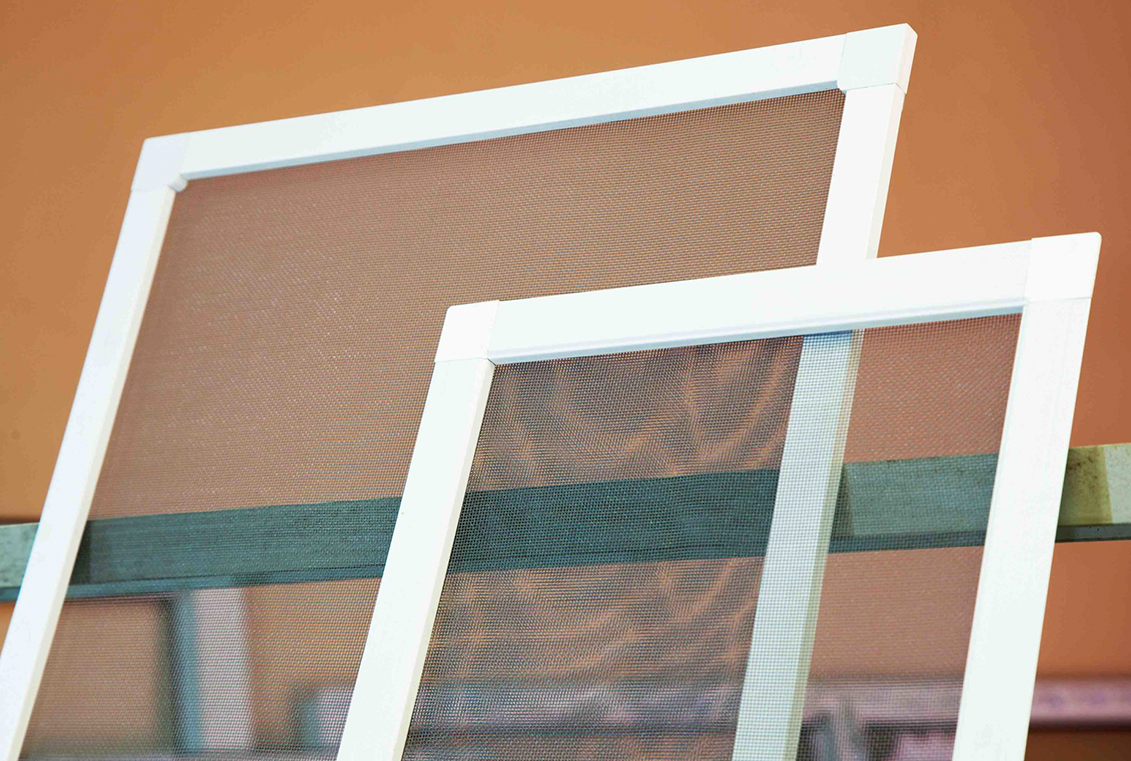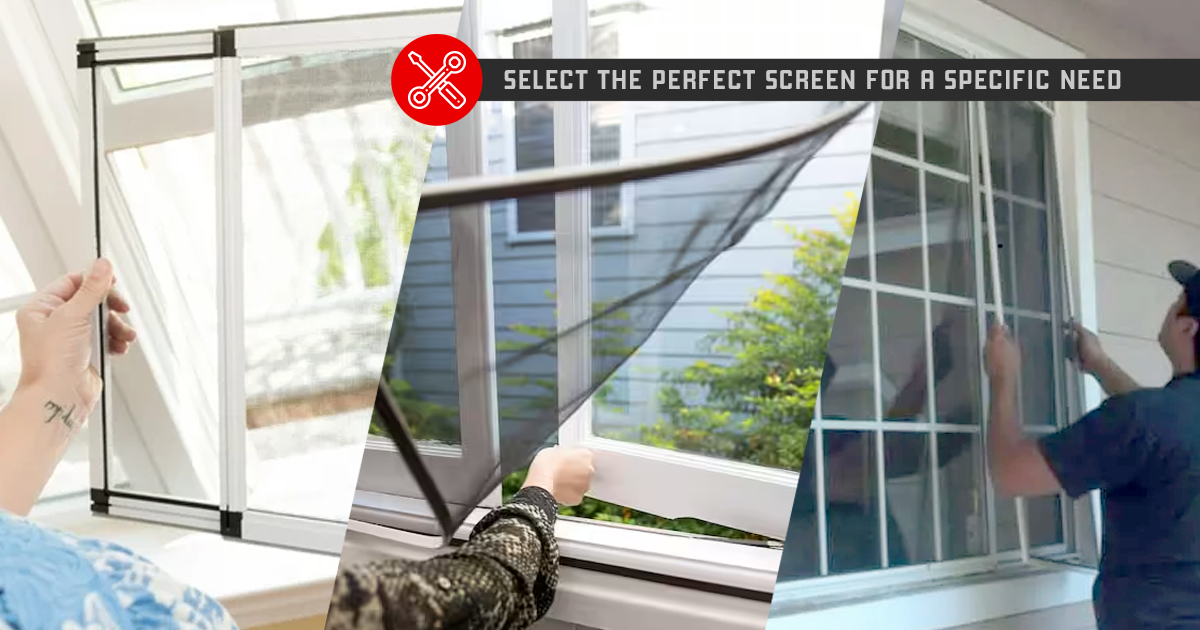Maximize Comfort & Safety at Home with Window Screens

Welcome to your comprehensive guide to window screens, a crucial component of any home that not only provides comfort and protection but also enhances the overall livability of your space. Whether you’re looking to install new screens or replace old ones, understanding the different types available, their materials, and their benefits can help you make the best decision for your home.

Types of Window Screens
Understanding the variety of window screens available can significantly aid in selecting the perfect type for your specific needs. Each type offers unique benefits tailored to different priorities such as enhancing comfort, increasing security, or improving aesthetic appeal. Here’s a look at each type:
• Solar Window Screens
Solar window screens are specially engineered to block out the sun's harmful UV rays, significantly reducing heat and glare within your home. This can lead to a cooler indoor environment during hot weather, which in turn can help lower air conditioning costs and energy consumption. Solar screens are particularly beneficial in regions with intense sunlight and can protect furniture and flooring from sun damage.
• Insect Screens
The traditional role of window screens is to keep insects out while allowing fresh air to flow into the space. Made from materials like aluminum, fiberglass, or polyester, insect screens are designed to be fine enough to obstruct common pests such as mosquitoes, flies, and bees without obstructing air flow. They are a staple in any home, particularly in areas prone to insect-related disturbances.
• Security Screens
Security screens are robust and designed to provide a tough barrier against potential intruders, all while maintaining the aesthetic and functional aspects of traditional screens. Made from heavy-duty materials such as stainless steel, these screens are resistant to tampering and cutting. Security screens are an excellent choice for ground-level windows and those seeking extra peace of mind in urban environments.
• Privacy Screens
Privacy screens help maintain a sense of seclusion without sacrificing natural light. They are constructed from materials that obscure the view into your home from the outside but still allow occupants to see out relatively unobstructed during the day. Privacy screens are ideal for homes close to streets or other houses and can vary in opacity depending on the level of privacy desired.
• High-Visibility Screens
High-visibility screens offer the best of both worlds—protection from insects and an unobstructed view of the outdoors. These screens use ultra-fine mesh that is almost invisible to the naked eye, enhancing the clarity of your view through the window. They are perfect for homeowners who do not want to compromise on the view while keeping out the smallest of pests.
• Adjustable and Retractable Screens
Adjustable and retractable screens provide flexibility for homeowners who may not need screen protection year-round. These screens can be easily adjusted or retracted when not in use, making them ideal for areas with seasonal pest populations or for windows that are used infrequently.
• Specialty Screens
There are also specialty screens that cater to specific needs. For instance:
- Allergy-reducing screens can filter out pollen and other allergens from the air, making them a great option for allergy sufferers.
- Sound-dampening screens help reduce noise pollution, a useful feature for homes in noisy neighborhoods or busy streets.
- Fire-resistant screens are made from materials that can withstand high temperatures, suitable for areas prone to wildfires.
Each type of window screen offers unique benefits and can be selected based on the specific requirements of your home environment and your personal preferences. Whether you prioritize safety, privacy, or simply keeping out pests, there’s a window screen perfectly suited to meet those needs.

Benefits of Window Screens
Installing window screens comes with numerous advantages:
- Ventilation: Screens allow you to enjoy fresh air without the intrusion of insects or debris.
- Energy Savings: By blocking solar heat, certain screens can help reduce your reliance on air conditioning, significantly lowering your energy bills.
- Increased Privacy: With the right type of screen, you can maintain privacy in your home while still enjoying natural light and views of the outside.
- Protection from Pests: Screens are an essential barrier against insects and other pests that might carry diseases or cause discomfort.
How to Choose the Right Window Screen?
When selecting a window screen, consider the following factors:
- Purpose: Determine what you need the screen for—pest control, privacy, solar protection, or pet resistance. Each need corresponds to different types of screens.
- Material: Choose a material that suits your climate and usage needs. Aluminum and stainless steel are great for longevity and durability, while fiberglass might be sufficient for general insect protection.
- Visibility and Airflow: Consider how much visibility and airflow you want. Higher visibility screens are less noticeable but might offer less protection against tiny insects.
Proper installation and regular maintenance are crucial for maximizing the effectiveness and lifespan of your window screens. Here are tips to help you ensure that your screens are always in top condition:
Installation Tips
- Measure Accurately: Before purchasing any window screen, ensure that you have the correct measurements of your window frame. This is crucial for a snug fit, which is necessary to prevent bugs from entering and to maintain the aesthetic integrity of the installation.
- Choose the Right Tools: For DIY installation, you will need basic tools such as a tape measure, spline roller, utility knife, and screwdriver. Make sure you have all these tools on hand before you start.
- Secure the Frame: If you are installing a new frame, ensure it is securely attached to the window. This may involve drilling and screwing the frame into place, depending on the type of window and frame.
- Lay the Screen Material: Roll out your chosen screen material (fiberglass, aluminum, etc.) over the frame. Cut it to sizes, leaving about an inch extra on each side to ensure it covers the entire frame.
- Use a Spline Roller: Attach the screen material to the frame using a spline (a flexible cord that locks the screen into the frame). Use the spline roller to push the spline into the groove of the frame, which holds the screen tightly in place.
- Trim the Excess: Once the screen is secure, trim any excess material using a utility knife for a clean finish.
Discover the Best Window Screen Solutions at DK Hardware
Whether you're upgrading your home or handling a professional installation, finding the right window screen can significantly enhance both the functionality and aesthetics of your space. At DK Hardware, we offer a wide range of window screens that cater to various needs—from improving airflow and blocking pests to increasing privacy and security. Here’s a quick guide to some top picks you can find in our store:
- CRL AWS20M 20" Adjustable Window Screen
- CRL White 39" Retractable Window Screen
- CRL BRONZE 39” RECTRACTBLE WINDOW SCREEN
- Duo-Corp Basement Window, Double Slider
- CRL Bronze 55" Retractable Window Screen
- Duo-Corp Slider Basement Window

At DK Hardware, our selection of window screens and accessories provides you with numerous options to meet both functional and aesthetic needs. Click on any link to be redirected to some of the best window screen solutions available.
For any specific questions, or to get a quote, feel free to reach out to us via email at sales@dkhardware.com or call us toll-free at 877-509-8040.
